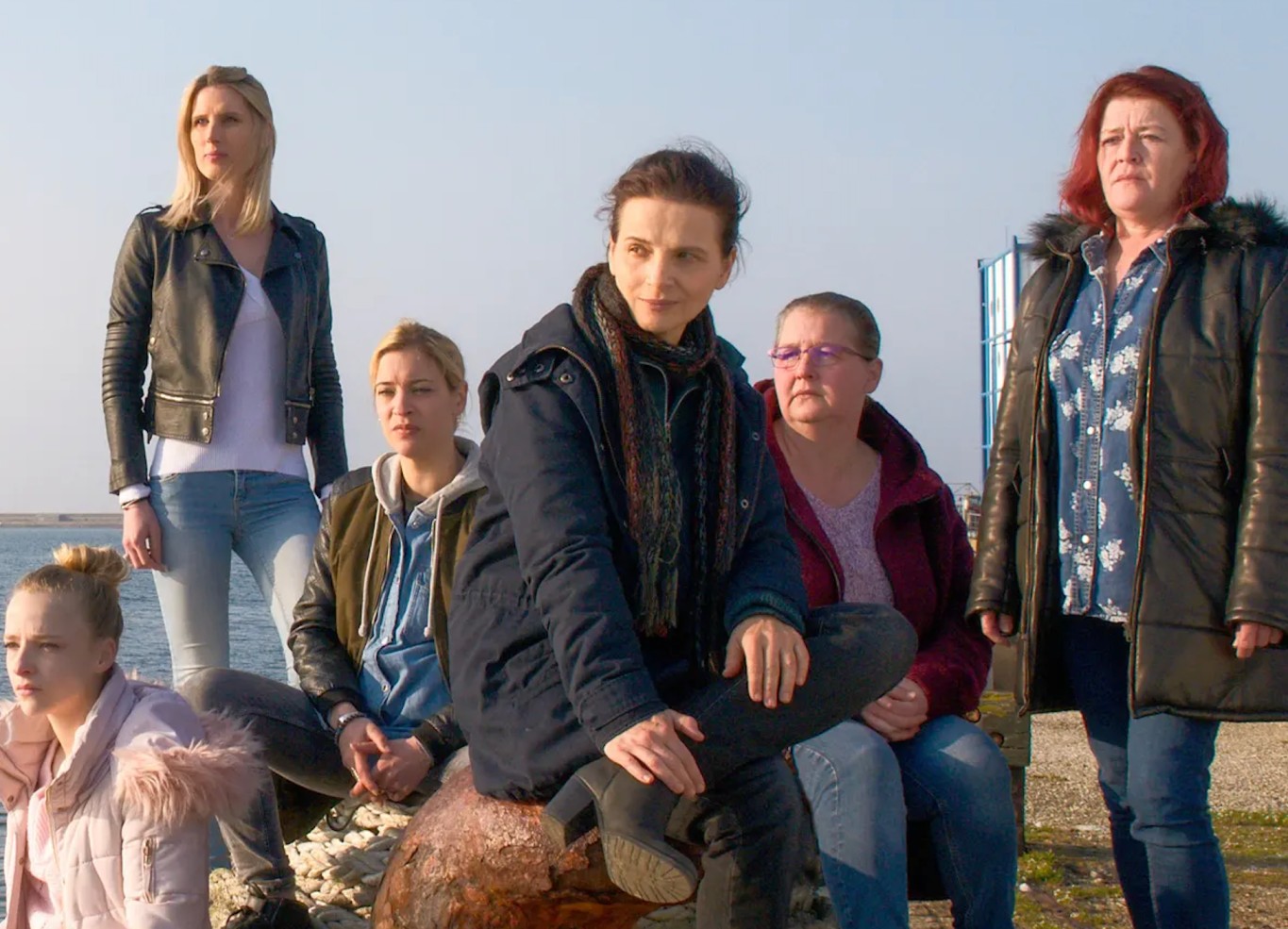“Between Two Worlds” (2021) – A housekeeper, chambermaid, maintenance technician, and maintenance agent.
They are all similar monikers for one vitality important job, a cleaning person, a position in great demand, but by and large, the role is arduous and thankless.
Journalism – a laborious, underappreciated field – shares much in common with the cleaning industry, especially in recent years, and in director Emmanuel Carrere’s “Between Two Worlds”, Juliette Binoche plays Marianne Winckler, a woman who willingly accepts both jobs.
Marianne, a Parisian journalist, travels 250 km west to Caen and works undercover as a cleaning woman to write a story and shed some light on this scrubbing, dusting, washing, and vacuuming vocation and the adversities surrounding it.
Carrere’s movie premiered at the 2021 Cannes Film Festival and finally receives the light of day (in the U.S.) in August 2023.
Not only does the film have a bit of history behind it – in terms of pure time – but Carrere and Helene Devynck wrote the screenplay based on Florence Aubenas’ 2010 nonfiction book “Le Quai de Ouistreham”. Aubenas, an investigative journalist, worked similarly to her on-screen counterpart, Winckler, where they both accepted strenuous, low-paying jobs.
Generally speaking, economic salvation is challenging, but it’s darn near impossible for these workers.
Aubenas’ book sounds like Barbara Ehrenreich’s famous 2001 read, “Nickel and Dimed: On (Not) Getting By in America”.
As the film opens, Marianne attempts to gain employment at an agency as a 40 or 50-something masquerading as a housewife without a concrete work history. She claims to have graduated from law school 23 years earlier but never practiced due to financial solvency through her (fictional) husband’s business. Without much consternation, she’s hired as a cleaning woman. She begins her alter-ego journey and documents the drudgery when she’s not scrubbing toilets, washing windows, changing bedding, and wiping down microwaves.
Early in the first act, Marianne is bent over and scouring public toilets, and her shoulder-length black locks fall in front of her face and into the bowl’s rim. She doesn’t hold her nose in disgust or back down from the challenge. Still, this scene demonstrates one of the few moments – ironically – when the audience witnesses the visceral, physical difficulties on the job.
Sure, over the 106-minute runtime, the film highlights scenes when cleaning crews have stress.
For instance, without a car, how will Marianne or her colleagues – like Chrystele (Helene Lambert) – easily arrive on-site at 6:30 am? For Chrystele, she walks several kilometers to work two or three shifts a day. Having a car of one’s own is a faraway luxury.
How would one pay for gas, insurance, repairs, etc. on only 7.96 euros an hour?
There are others too. Marianne meets Cedric (Didier Pupin), who lost his car through a towing incident because he didn’t have the cash to pull it out of hock. A cleaning contracting manager explains that she is forced to endure verbal abuse from her boss because her job provides an extra 12 hours of pay a week.
Chrystele has three young boys, so how is she financially scrapping by? It’s anyone’s guess.
These reveals, however, are driven by discourse and not on-screen events. The screenplay documents that these hardships exist, but do we feel the characters’ anxiety? That’s an open question, but for the most part, the film tells us their problems.
It doesn’t often show us.
Rather than dive into the financial and emotional plights that happen in the moment, like in Ken Loach’s wildly compelling gig economy drama, “Sorry We Missed You” (2019), “Between Two Worlds” devotes large swathes of minutes toward the workers’ camaraderie. Laughs over team meetings and joys at a bowling party give our supporting players reprieves from their long, grueling workdays.
Marianne joins them as an undercover outsider.
Juliette gives a convincing performance with Marianne’s double-agent persona, and the movie’s second half leans into her deception with her new friends. They don’t know she’s a journalist. Still, the tension over Marianne’s moralistic conundrum doesn’t feel as palatable as it probably should, although the third act’s human collision is fairly effective in dishing out bumps and bruises.
Marianne’s pressure doesn’t register like Terry’s (Sean Penn) undercover work in infiltrating the Irish mob in “State of Grace” (1990) or “The Boston Globe” reporters investigating the Catholic Church’s unholy problems in “Spotlight” (2015). Then again, this movie’s subject is more inherently nuanced than hard crime. Carrere and Binoche get their points across, and “Between Two Worlds” dives deeply into business relationships, friendships, and Marianne’s duplicity (no matter how noble her intentions), and these filmmaking objectives give depth to the characters. Unfortunately, the tolls of 15-hour shifts, zero bank balances, no sick days, empty bellies, and desperate cries for help largely – but not completely – go unseen in real time, as the film doesn’t reach for the stars to document ground-level hardships.
![]()
![]() out of
out of ![]()
![]()
![]()
![]()
Directed by: Emmanuel Carrere
Written by: Emmanuel Carrere and Helene Devynck, based on Florence Aubenas’ book
Starring: Juliette Binoche, Helene Lambert, Lea Carne, and Didier Pupin
Runtime: 106 minutes
Image credits: Memento Distribution






